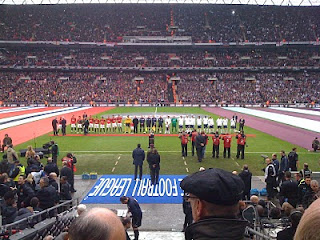United: The Religion

Went to the Carling Cup Final at Wembley today. United were the deserved winners, even though Vidic was a tad lucky not to be sent off early on. Rooney is sheer class - even with a bad knee and a stomach bug he was still the best player on the pitch. He is the complete player - scores goals, a great passer of the ball, reads the game so well. Carrick and Fletcher were in control in midfield and Valencia was always a threat. This came after leading a good Communion Service at college this morning (not good because I led it, but it had a great sermon from Simon Downham and some good prayer ministry too). It's not often these two big bits of my life - God and football - come together quite so adjacent to each other. I feel like I ought to come up with some deep thought to connect the two, but I'm not sure I can. Both make me feel more alive. Faith does so in deeper ways, with less danger of aggression and resentment. but football does still stir deep things. I'm just gratefu...



